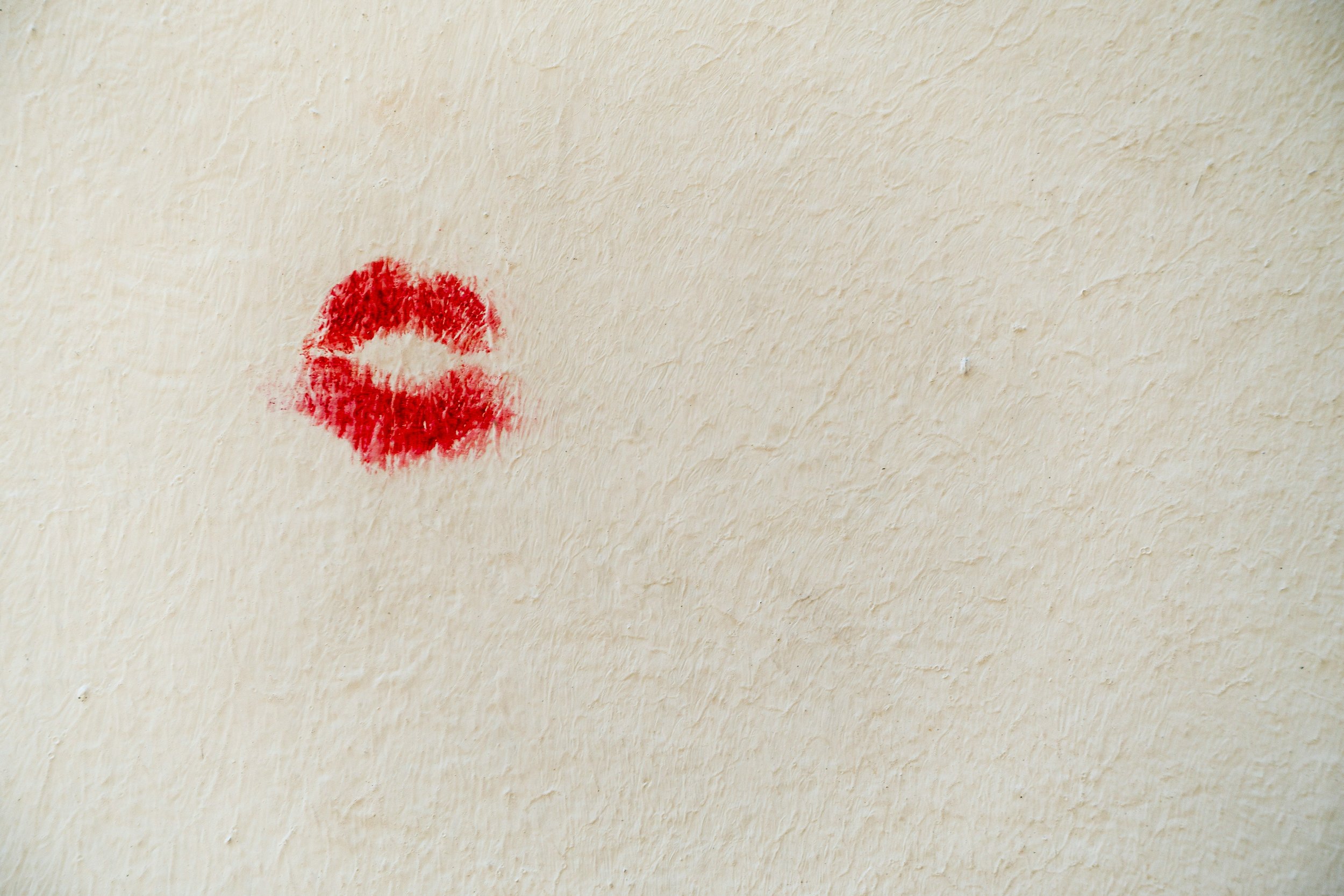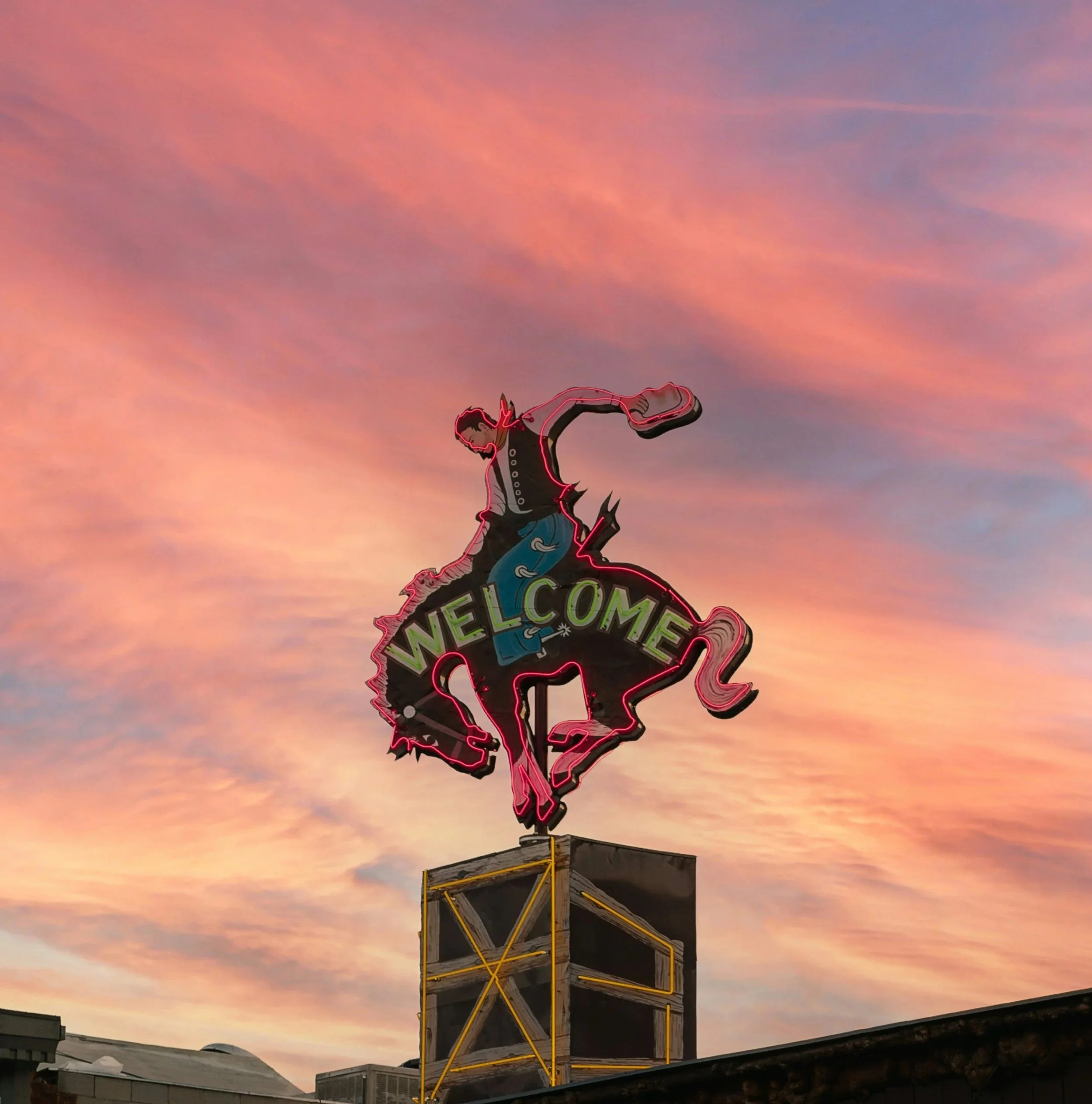To the Portrait of Anonymous Kisses

Nearly two dozen disembodied mouths are kissing one another, rendered in black on a white background. They surround a handwritten quote from a Dexter Palmer novel: “So if it mattered that a kiss meant something in your head, and everybody had a different idea of what a kiss meant and no one had the same idea, then every time any two people kissed each other they’d be lying to each other.”
I was skimming the "Goings On About Town" section of The New Yorker when I saw a photograph of you hanging on a gallery wall. I hadn’t heard of your artist or your gallery, or of Dexter Palmer, either. But something in the effortlessness of your composition compelled me to stop flipping the pages. I pulled the magazine to my face to take a closer look.
Among all these kissing mouths, a few were crossed out in a haphazard scribble. So was the name of Palmer’s novel from which the quote is excerpted, which was itself written off-center amongst the kisses. Glancing over at you again this very moment, to the wall by my front door where you now hang, I notice you are unsigned and undated—as if you were a page torn from a sketchbook. You are roughly the size of a piece of printer paper, and of the same thickness, too. This is why I’ve come to believe, seven years after first encountering you in the magazine, that you might actually be a doodle.
But I don’t feel scammed by these facts, despite paying money I did not have to a gallery on Orchard Street for you. If anything, the casualness of your pen-inked lines brings to mind the nonchalance with which I approached life back then. I had just left my marriage and I was kissing strangers without consequence, and there was something of a relief in the idea that these men and I were lying to each other every time we touched, the responsibility to one another canceled out by our unintentional but nonetheless mutual deception.
I was the one who no longer wanted to be married and I wanted very badly to stop feeling so guilty about it. The fact persisted anyway: I had left my husband. I couldn’t pretend it hadn’t happened, but I could try to make it feel smaller, lesser. And so, with the lips of others, I practiced non-attachment. Whenever I kissed someone else and did my best to feel numb, I was callousing myself to others and to the pain we could inflict upon one another.
That’s why I knew I needed you in my home, where I could return to your nonchalant mouths again and again for a moment of assumed absolution. I immediately emailed the gallerist and offered a price that was both exorbitant in my unemployed reality and a pittance in any gallery setting. To my surprise, my offer was accepted immediately; even this transaction was breezy.
*
The day I took the F train from Brooklyn to the Lower East Side to pick you up became significant for more reasons than only meeting you. A few doors down from the gallery, I visited a store with an alluring neon sign in its giant front window. Just as I did not have the money to purchase you, I did not have the money for the beautiful homewares that lined its plywood shelves, but in the same ways that I needed to possess you, I needed to have this little dish in the shape of a supine bathing lady. I can only assume that I was primed then to spot yet another example of a carefree woman, this time rendered in the palest of pink milk glass. I plucked her up from the shelf and was surprised by her heft. I subconsciously thought she’d be as light as her repose. I didn’t look at the price sticker, which I could feel was affixed to the bottom of her bowl. Instead, I carried her straight to the cash wrap and handed her to the man behind the counter.
“And so, with the lips of others, I practiced non-attachment.”
But this different, smaller purchase was not the other reason the day was a significant one. Rather, that was the day I met the first man in my post-divorce life who I would kiss and actually mean it. He was the one who accepted the bathing lady from my hands and wrapped her carefully in layers of brown paper. And when I returned to the store some weeks later to show off a photo of her belly bowl full of pieces of pink Starbursts, he was there again—just as I had hoped he would be. When I handed him my phone with the image, he asked if he could add his number to it. I remembered the care with which he’d wrapped my dish and told him yes.
The kiss between us came not long after. Unlike the ones before it, I cared about my intentions and his. He was handsome and kind and funny and all the other things that made me want to close my eyes and lean in close. Still, I’m not sure he was really so much different than the men who had preceded him. Rather, I was different: I wanted to care. After so many months of trying to minimize my divorce and anesthetize myself against its impact, I wanted to feel the bigness of love again, even if it meant feeling the pain of it, too.
I thought my purchase of you was marking the start of a new way of existing in the world, one defined by unattachment. But now I can see it represented the end of one instead. It was as if I had exorcized the pain of loving someone else by doing the very opposite, by loving no one at all for a while; by embodying so much nonchalance, I had freed myself from the need for it. You no longer represented someone I wished to be, but rather someone I had been—and I never wanted to forget her.
“You no longer represented someone I wished to be, but rather someone I had been—and I never wanted to forget her.”
The kissing between the man from the store and I never evolved into something more. But on the afternoon I picked you up, I walked into the gallery right after meeting him, not yet aware that I’d met someone I would come to care about—if only for a short while—and in doing so, was on the precipice of encountering a different version of myself. And because of this, when I met someone else soon after, I kissed this new man, and only him, for the next few years.
*
The kissing mouths of your composition are disembodied and anonymous. They are anyone. After nearly a decade as someone who existed in the context of another person, first as a girlfriend and then as a wife, I wanted to be anyone, too, at least for a moment. Anyone isn’t specific. Anyone isn’t even someone. Anyone doesn’t owe anything to anyone else, not even an apology.
I never visited the gallery again, but I did see your artist a handful of times. As it was, she used to be a server at a small restaurant I frequented downtown. I ate there often because it was just down the street from the studio where I eventually found work. After a long day, I would sit at the bar to eat a black rice salad with a glass of chilled wine. One evening, I must have mentioned you to the usual bartender, because he told me that the artist worked there, too, and pointed to a petite woman across the restaurant. I begged him not to say anything to her and I never introduced myself either. To the artist, at least, I still wanted to be anyone, too.
About the Author
Claire Salinda is a writer and tarot reader from Los Angeles and New York. Her work has appeared or is forthcoming in the Los Angeles Times, Image, The Missouri Review, Assay, G*Mob, Thrillist, and Pen and Ink, among others, and has been supported by the Prospect Street Writers House. She holds an MFA in nonfiction and literature from the Bennington Writing Seminars. Claire is at work on a memoir in essays that engages with identity, nostalgia, and place, through the lens of a mixed-race Asian woman in America. Sometimes she writes about surfing, too.
Read Claire’s “Behind the Essay” interview in our newsletter.
Edited by Anya Tchoupakov.
Header photo by Etienne Girardet.












